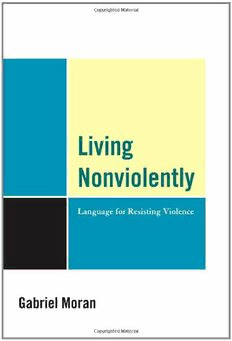Download Living Nonviolently: Language for Resisting Violence PDF Free - Full Version
Download Living Nonviolently: Language for Resisting Violence by Gabriel Moran in PDF format completely FREE. No registration required, no payment needed. Get instant access to this valuable resource on PDFdrive.to!
About Living Nonviolently: Language for Resisting Violence
Are human beings naturally violent? Is war the fate of the human race? Despite the depressing record of the past, the world's future depends upon avoiding war and drastically reducing violence. Living Nonviolently: Language for Resisting Violence examines carefully the language of violence and war. One of the first casualties of violence is language, which in turn makes resistance to violence difficult to articulate. In the first four chapters, Gabriel Moran proposes distinctions for the interconnected ideas of force, power, aggressiveness, violence and war—not to invent a new and logical language but to ground the meaning of these terms in our human experience. That revitalization of ordinary language depends upon an inclusive language of men and women, adults and children, human and nonhuman animals. The fifth chapter locates the potential for both encouraging violence and resisting violence in the peculiar logic of religion. Jesus' Sermon on the Mount is commonly invoked by people who say that nonviolence may be an admirable ideal for a few people but it is irrelevant for most people and for all nations; in this chapter, Moran examines the widely misunderstood sermon in detail to illustrate its potential for resisting violence. For a conclusion, he discusses practical means of education that are helpful to reaching some understanding of violence and resistance to violence.Living Nonviolently is written for scholars in peace studies, political philosophy, or religious studies and for anyone who wishes to understand the roots of violence and war.
Detailed Information
| Author: | Gabriel Moran |
|---|---|
| Publication Year: | 2011 |
| ISBN: | 9780739150450 |
| Pages: | 216 |
| Language: | |
| File Size: | 0.802 |
| Format: | |
| Price: | FREE |
Safe & Secure Download - No registration required
Why Choose PDFdrive for Your Free Living Nonviolently: Language for Resisting Violence Download?
- 100% Free: No hidden fees or subscriptions required for one book every day.
- No Registration: Immediate access is available without creating accounts for one book every day.
- Safe and Secure: Clean downloads without malware or viruses
- Multiple Formats: PDF, MOBI, Mpub,... optimized for all devices
- Educational Resource: Supporting knowledge sharing and learning
Frequently Asked Questions
Is it really free to download Living Nonviolently: Language for Resisting Violence PDF?
Yes, on https://PDFdrive.to you can download Living Nonviolently: Language for Resisting Violence by Gabriel Moran completely free. We don't require any payment, subscription, or registration to access this PDF file. For 3 books every day.
How can I read Living Nonviolently: Language for Resisting Violence on my mobile device?
After downloading Living Nonviolently: Language for Resisting Violence PDF, you can open it with any PDF reader app on your phone or tablet. We recommend using Adobe Acrobat Reader, Apple Books, or Google Play Books for the best reading experience.
Is this the full version of Living Nonviolently: Language for Resisting Violence?
Yes, this is the complete PDF version of Living Nonviolently: Language for Resisting Violence by Gabriel Moran. You will be able to read the entire content as in the printed version without missing any pages.
Is it legal to download Living Nonviolently: Language for Resisting Violence PDF for free?
https://PDFdrive.to provides links to free educational resources available online. We do not store any files on our servers. Please be aware of copyright laws in your country before downloading.
The materials shared are intended for research, educational, and personal use in accordance with fair use principles.

